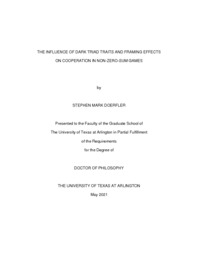
ATTENTION: The works hosted here are being migrated to a new repository that will consolidate resources, improve discoverability, and better show UTA's research impact on the global community. We will update authors as the migration progresses. Please see MavMatrix for more information.
Show simple item record
| dc.contributor.advisor | Levine, Daniel | |
| dc.creator | Doerfler, Stephen M | |
| dc.date.accessioned | 2023-06-27T17:27:11Z | |
| dc.date.available | 2023-06-27T17:27:11Z | |
| dc.date.created | 2021-05 | |
| dc.date.issued | 2021-05-05 | |
| dc.date.submitted | May 2021 | |
| dc.identifier.uri | http://hdl.handle.net/10106/31323 | |
| dc.description.abstract | Over the past two decades, personality research has increasingly focused on describing the selfish, callous, and impulsive qualities that are present in individuals with higher levels of Dark Triad traits (i.e., narcissism, psychopathy, and Machiavellianism). However, little is known about the situational factors that contribute to the selfish behavior of these individuals. The current investigation aimed to address this gap in the literature by combining personality and cognitive theories of decision making to examine the relationship between the Dark Triad traits and uncooperative behavior under different risk and valence framing conditions in one-shot non-zero-sum games. Participants were randomly assigned to one of four conditions based on a 2 (gain vs. loss framing) × 2 (normal- vs. high-risk condition) between-subjects design. The prisoner’s dilemma game was used to represent normal risk and the chicken game was used to represent high risk. Overall, results supported prospect theory predictions regarding the effect valence framing has on decision making under risk and replicated previous findings regarding valence framing effects in the absence of risk. This investigation did not uncover a significant main effect of Dark Triad traits on cooperation. However, the Dark Triad traits and framing conditions did interact to predict differences in cooperation, partially supporting recent fuzzy-trace theory predictions. In addition, the current investigation uncovered nuances among the Dark Triad traits in relation to callousness and impulsiveness; and, in an exploratory analysis, a relationship between the Dark Triad traits and study attrition. Detailed findings and future directions are discussed. | |
| dc.format.mimetype | application/pdf | |
| dc.language.iso | en_US | |
| dc.subject | Dark triad | |
| dc.subject | Narcissism | |
| dc.subject | Psychopathy | |
| dc.subject | Machiavellianism | |
| dc.subject | Cooperation | |
| dc.subject | Decision-making | |
| dc.subject | Fuzzy trace theory | |
| dc.title | THE INFLUENCE OF DARK TRIAD TRAITS AND FRAMING EFFECTS ON COOPERATION IN NON-ZERO-SUM GAMES | |
| dc.type | Thesis | |
| dc.date.updated | 2023-06-27T17:27:11Z | |
| thesis.degree.department | Psychology | |
| thesis.degree.grantor | The University of Texas at Arlington | |
| thesis.degree.level | Doctoral | |
| thesis.degree.name | Doctor of Philosophy in Psychology | |
| dc.type.material | text | |
Files in this item
- Name:
- DOERFLER-DISSERTATION-2021.pdf
- Size:
- 662.3Kb
- Format:
- PDF
This item appears in the following Collection(s)
Show simple item record


